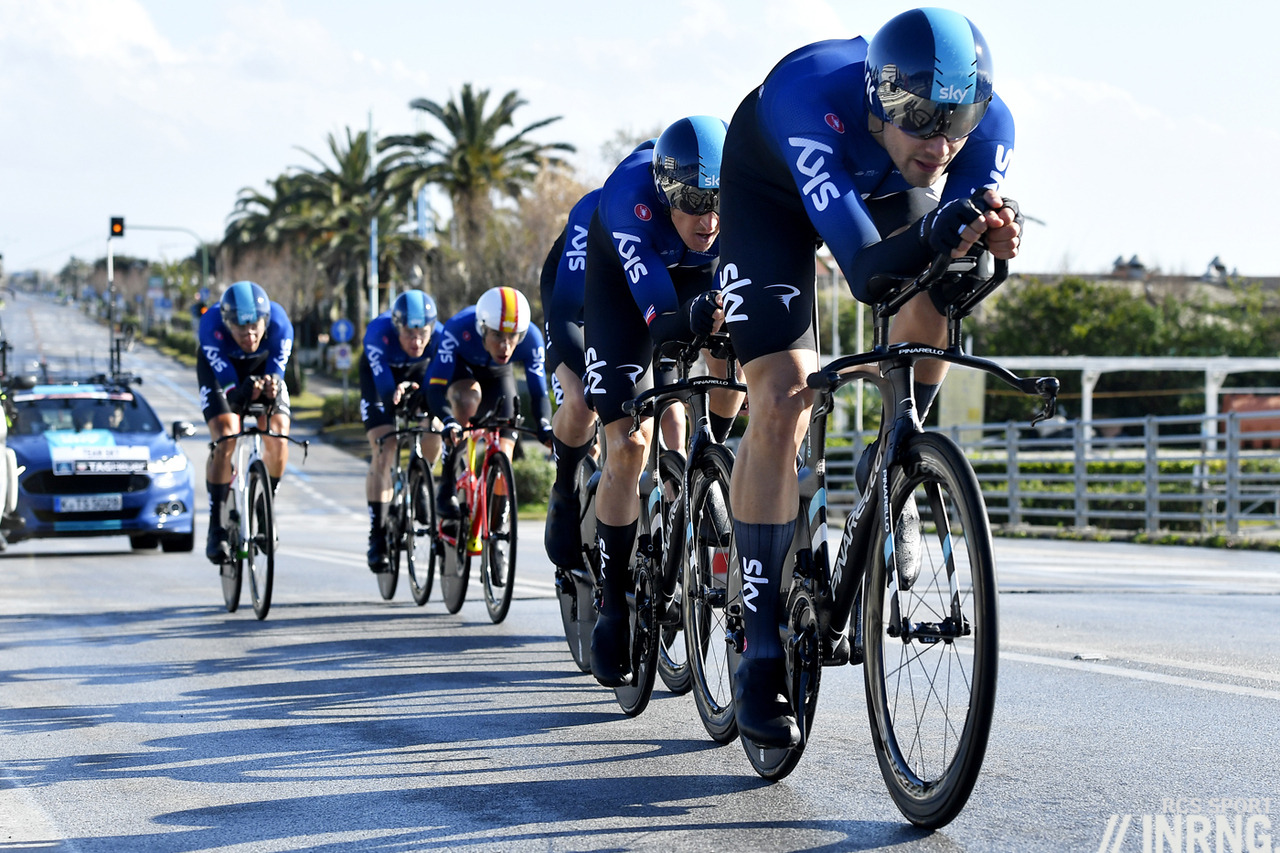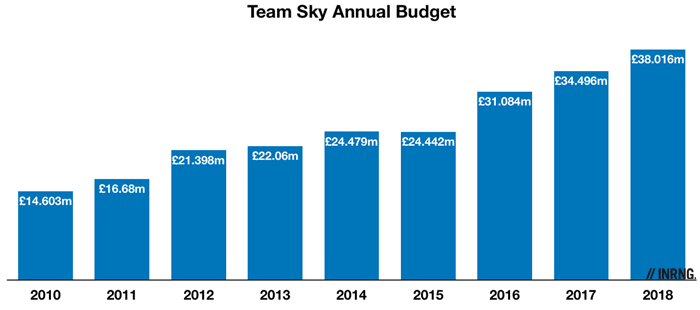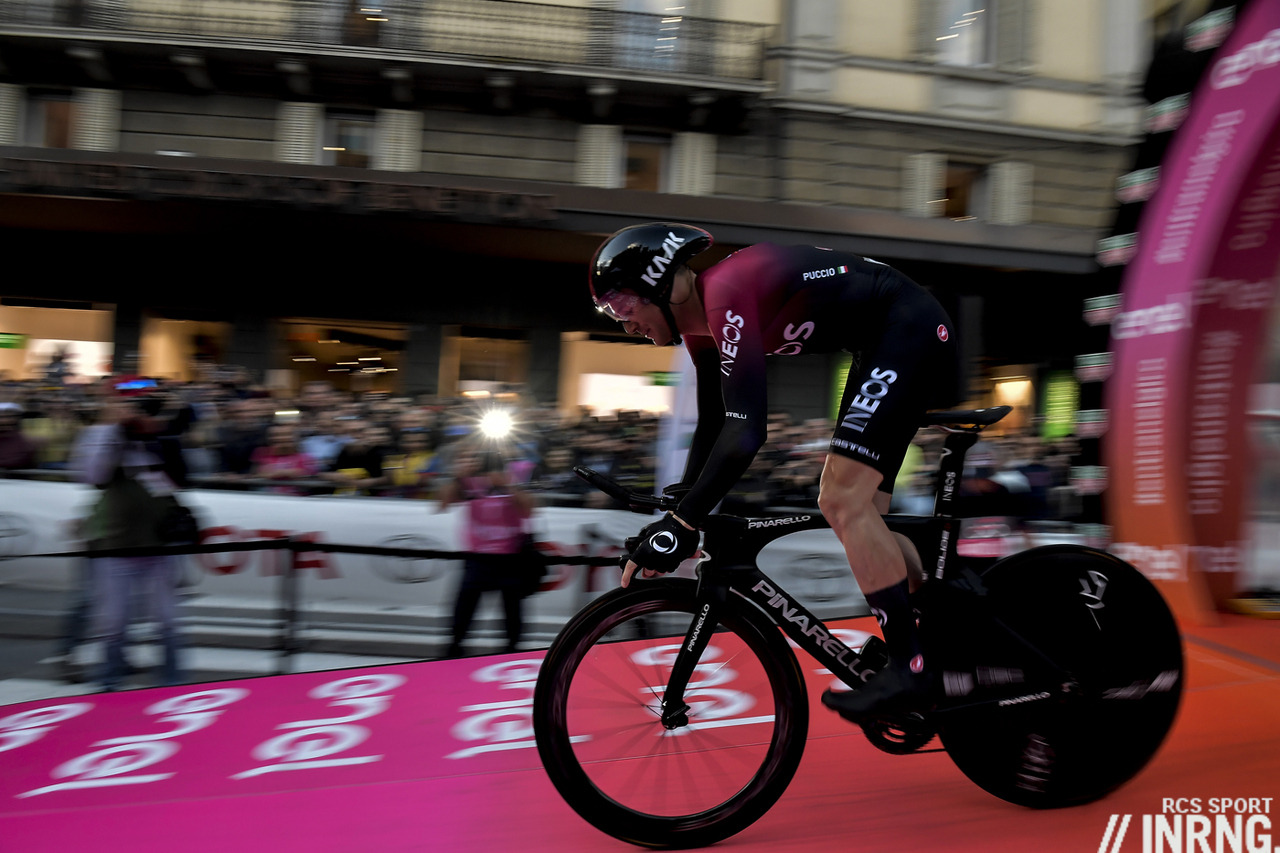
Team Sky’s accounts for the year ending 2018 have been published and if they’re Ineos today, the company behind it all remains the same so here’s a closer look at their most recent accounts and budget, another record year.
Team Budget = £38 million

Team Sky’s budget was £38,016,000, up 10% on the previous year as the screengrab from their filed accounts shows. It was equivalent to US$48.3 million or €41.8 million.
Again the budget is for the year ending December 2018. In recent year’s Sky’s accounts have come out in September but perhaps because of the change of ownership from Sky to Ineos they’re available now.

As you can see the budget is up again for 2018 and the accounts are clear about why, it’s “a result of an increase in title sponsorship reflecting strong rider performance leading to higher staff and rider costs” which translates as winning both the Giro, Tour and more resulted in bonus payouts. There’s no mention in the text or the account of any legal fees relating to resolving Chris Froome’s salbutamol case.
Inside the accounts there’s a breakdown of the budget into three lines.

- Title sponsorship is naming rights, as in Sky and also income from 21st Century Fox at the time, a later note in the accounts shows £23.5 million from Sky, £4.1 million from Fox; there’s also an additional provision recognised of £3.2 for “staff and rider costs” meaning it is setting aside money that it is likely to have to pay out, the amount a year ago was £2.8 million meaning the provision has increased. It’s technical but remember the amount the team is setting aside here for a likely payout at possibly unknown point is a sum of money equivalent to many a Pro Conti team budget.
- Performance sponsorship is the companies who don’t just supply the team with kit, they pay for the privilege so the likes of Pinarello, Castelli or Henri Lloyd leisurewear and so on.
- Value in kind usually means goods provided rather than cash, for example it could include a team car delivered by Ford and Pinarello frames.
As for the assets, well you might think that’d be the riders but the accounts don’t show them, neither the rider or the contracts, just the expense of their wages. The actual value of assets held by the team amounts to £6.6 million of which only £92,000 are things you can touch like property, plant and equipment (although this is an accounting value after they are depreciated in value each year, eg they could surely sell one team bus for more than this quoted amount), the rest are cash, a deferred tax payment and trade receivables, jargon for IOUs.

Enter Ineos
The last time we looked at the accounts, Sky was the subject of takeovers and the team’s sponsorship wasn’t certain on the other side of this. But the withdrawal of Sky still came as a surprise. The team found a new sponsor within months in Ineos and this meant that Ineos bought Tour Racing Limited, the company that is legally the team. The British media have reported an even bigger budget for Ineos at £40 million but were this to be the number for 2019 and 2020 it could represent a slowing in the annual budget increases.
Was Team Sky ever Sky’s team? Yes in the legal sense but also in the branding and communications and it’ll be interesting to see if Team Ineos starts to reflect its owners Ineos who have a much quieter corporate communications strategy, they’re not a consumer brand or even a household name in the UK. Indeed Ineos has grown big having bought unloved assets, stripping out costs, narrowing product ranges and generally applying a scalpel (or chainsaw) to its sector. It’s hard to see this happening in cycling especially as the project seems to be driven by Ineos founder and chairman Jim Ratcliffe as a personal project rather than corporate branding exercise, he is also funding a sailing team and an attempt to run a marathon under two hours.
Conclusion
The biggest budget got bigger, the team seemed to enjoy an open line of credit with its sponsors Sky and 21st Century Fox and we’ll see if the set up is the same with Ineos, probably yes and the first clue to this will be the recruitment, we’ll see who they retain, who joins and who leaves as a first clue. As ever though Sky’s budget is online thanks to transparency laws in the UK when most other teams are private. The UCI does audit team finances so the numbers exist and can be compared but only in private among team owners and the UCI.
- Accounts available online at companieshouse.gov.uk
- Exchange rates at 31 December 2018: £1 GBP = US$ 1.27 = €1.10

Wow, they’re right at the threshold of $50 million in US dollars. I’m guessing it’s roughly double the budget of mid-tier WT teams, and about triple the budget of those with the lowest budgets. Dominating the TdF obviously doesn’t come cheap.
The strange thing is Kevin in a couple of months lots of people here will no doubt say that riders from AG2R, Movistar, Sunweb and even EF Education First can genuinely win the Tour. Since 2012 its only happened once that Sky/Ineos didn’t win and then it was because their contender crashed and broke bones meaning they weren’t effectively in the race at all. Is it to be suggested by critics, therefore, that they can effectively buy the Tour if their guy or guys stay upright? What they have proved is that funding is there if you know the right people but that these same people demand success for their buck. Those who can’t get such funding only complain, on the other hand, because they don’t know such people. If someone was slapping $50M on their desk they certainly wouldn’t be saying no or complaining about other teams and their budgets.
You’re underestimating the difference.
And I’m afraid that budget is the indirect way they dominate the Tour – that domination is not that much related to the sporting aspect, which is, however, obviously involved, too.
Just to give you an example of your wild underestimation, Movistar’s yearly budget (which is going to be stable in the 2016-2021 period) is barely 40% of Sky’s (17 M €). Same for Astana until 2020. And, again, same goes for Ag2R. Quickstep and Sunweb are just a little above and neither gets to half of Sky’s budget. This is actually by any means the *top-tier* of WT, which by the way covers Sky’s rivals for the TdF podium. Long gone are BMC and Katusha better years, which came a little closer to Sky, at least in terms of budget. Speaking of TdF “contenders”, EF reportedly sits at 15 M $, and that’s what was called by the press the *mid-tier* in 2017, including the likes of Trek-Segafredo, Orica or DD (12-15 M $, that is 25-30% of Sky’s budget).
Interested where you get the often quoted €17m number for Movistar? A back of a fag-packet calculation of their three star-riders’ salaries (Valverde, Landa and Quintana) would probably consume nearly half that amount, leaving very little for the other riders, let alone staff, equipment and all the other stuff.
As M. Ring notes, few of the other teams publish accounts and not in the same level of detail so we really don’t have many comparators against Team Sky’s budget, but I would strongly suspect that both Movistar and Astana would be somewhere in the same ball-park.
I’d go lower for the combined salaries of the “trident” and remember that to sign Landa Movistar had to see several riders go. Their budget is a long way short of Sky. Astana’s big budget days are over too, once they were within touching distance of Sky, now I’d estimate they’re well short.
Both the Movistar and Astana deal were reported in detail respectively by the Spanish press specialised in economy and finance and by the Kazakh “international-wise” press (Astana Times). It was corporate boasting in both cases, not targeted to the sporting public but to the big-spending investors one, so I’d say that there was no reason to publish smaller budgets than the real ones, quite the other way around.
By the way… of course, sources can be wrong and should be read critically, but I always found amusing how people favour their own imagination over available information. And, as a consequence, when faced with informed opinion, opt for outright denial!
I assume that total sponsorship in other teams the previous years have remained the same or increased less than Sky?
We don’t have the numbers (the French teams do publish accounts http://inrng.com/2018/10/the-finances-of-ag2r-la-mondiale-matmut/) but as a rough guide all team budgets are up, there’s never been as much sponsorship in the World Tour, Pro Conti and women’s cycling and it’s been increasing well above inflation for many years.
For the men the UCI do publish the amount held as bank guarantees for 25% of the wage bill and this depends on rider numbers in part but also the general level of wages and it’s bigger than ever but it’s am indirect proxy for rider wages.
I am not sure if it is still the case but in the UK football Premier League and lower divisions did not show their players values as assets in their Audited Accounts. The best football players have a transfer value vastly in excess of even football ground values in the top teams and that type of transfer market does not exist in cycling. Even allowing for Wiggins being bought out from Garmin there appears to be no inherent value in a cyclist, they are just a cost in accounting terms.
I suspect many Agents in cycling could only dream of the commisions earned by Agents in UK and World football from arranging transfers of the players they “manage”
Sky have bought riders out of contract thanks to their budget, eg Wiggins but also Swift so they’ve helped establish a market. There’s talk of creating a transfer market – and riders can already move mid-season, eg Rohan Dennis left Garmin for BMC, but only from 1-15 August – but it would be a lot smaller. For starters most riders are signed on 1-2 year deals so there’s no need to buy them out and there’s less need. I could see Katusha wanting to sign Sam Bennett at the moment but there wouldn’t be much of a fee, it could suit Bora to unload him, it could suit Bennett to move to a new team on a bigger contract so Katusha wouldn’t pay much.
I would hate to see Sam Bennett jump to Katusha. That team seems to be a bit of a black hole for talent. Moverover, several young and upcoming sprinters have jumped teams and suffered setbacks in their progression. Bora obviously need to find more quality races for him to shine in, or perhaps more correctly designate a grand tour that is his to shine in, since this year he already has 6 victories despite Ackermann taking the Giro slot. Bennett also has been a little spotty in his consistency through the season, and it is unclear to me how he’d bear up as a team’s designated star through an entire year. As Sagan as steadily shifted away from being a serious contender in bunch sprints, I could even see he and Bennett both doing races together, so that opposing teams can’t focus on one or the other.
All that money and they couldn’t throw a few quid into running a womens team ?
Brailsford said things came together quickly for the new Ineos deal but they could look at this in the coming months.
Brailsford always seems evasive when this question is asked and at launch of Team ineos he was asked and gave a very politician answer of things moving so quickly with ineos sponsorship and changed the subject to talking about amount of work doing the rebranding then thanking the backroom staff for all their hard work.
Why do you think they are so reluctant to launch a women’s team? The hassle, the expectation it would be an immediate success?
Nice recap.
Can you publish the 25% UCI amounts – knowing that they are not accurate estimates?
It’s not so easy, I wanted to do a piece on this as if we multiply the number by four then it’s the total wage bill for the pro peloton, an interesting number to track over the years. But the number isn’t published it’s only a recent thing and there’s the exchange rate problem. The last figure in the UCI accounts through was CHF 95.5 million for 2017 and CHF 111.3 million for 2016 so the pro peloton wage bill for 2017 was CHF 382 and CHF 445 million for 2017, about €400 million for the 18 World Tour teams and 27 Pro Conti teams.